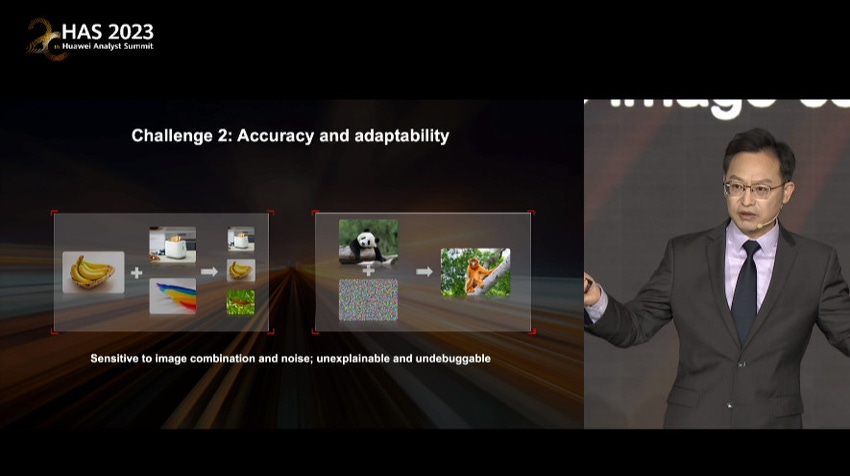Huawei kicked off its yearly analyst summit by discussing the current state of digital transformation and then delved into where bleeding edge tech like ‘super AI’ might take society.
April 19, 2023

Huawei kicked off its yearly analyst summit by discussing the current state of digital transformation and then delved into where bleeding edge tech like ‘super AI’ might take society.
Zhou Hong, President of Huawei’s Institute of Strategic Research (pictured), was first up to the podium at the Huawei Analyst Summit 2023, and gave a presentation looking at new forms of computing and how it can build an ‘intelligent world’ – which seems to be about stuffing more data analytics and AI into every corporate or industrial crevasse on the planet. We’re told new networks and new computing systems are what’s needed in order to move forward with this, and that there are a few bottlenecks standing in the way.
He spoke about the nature and potential of quantum computing and new sub-frontiers of computing research in a ‘post-Shannon era’, such as ‘hyperscale spatial dissipation’, ‘orbital angular momentum’, and ‘time reversal’ – which presumably is something more boring than an actual time machine, but who knows. ‘Super AI’ was also mentioned as something on the boil in R&D labs.
“Communications networks are the foundation of the intelligent world. We must continue breaking through bottlenecks in existing theory and technology, said Hong. “This is the only way forward.”
“Rethinking approaches to networks and computing is critical as we move towards an intelligent world. In networking, we have what it takes to move beyond the limits of Shannon’s theorems – as well as applications of his theory – to drive a 100-fold increase in network capabilities over the next decade. In computing, we will move towards new models, architectures, and components, and improve our ability to both understand and control intelligence. We will also continue to explore the use of AI for industry applications, science, and more.”
Hong was also keen to make sure AI ‘is what people want’. ‘We must create rules and laws,’ he said – a sentiment echoed by many tech leaders in the face of rapidly developing generative AI systems. His point was that there is no agreed upon definition of AI‘s ‘goal’, saying: “If we don’t have an agreed-upon definition, it’s almost impossible to ensure that the goals of AI and human beings will be aligned. It also makes it difficult to make reasonable classifications and computations”
There was a good amount of high-level science sprinkled in alongside boasting about some more real-world AI applications Huawei has developed, such as smart ports, smart mines, and smart airports in places like Hong Kong, Wuhan and Shenzen, and a weather predicting system which he said is 20% more accurate than European models.
Hong concluded: “Networks and computing are the two key cornerstones underpinning our shift from narrow AI towards general-purpose AI and super AI. To get there, we will need to take three key steps. First, we need to continue driving breakthroughs in theories and technologies to deliver ubiquitous intelligent connectivity and drive social progress. Second, we need to keep pushing our cognitive limits to better understand and control intelligence. Finally, we need to define the right vision and use the right approach to guide AI development in a way that truly helps overcome human limitations, improve lives, create matter, control energy, and transcend time and space. This is how our society as a whole will continue to evolve and thrive.”
Next up was Sebrina Meng, Huawei’s Deputy Chairwoman, Rotating Chairwoman, and CFO, who delivered some thoughts on digitalisation – and some general commentary on the progress of civilisation. The digital economy is having a totally transformative effect on the status quo, and soon computing power will be available whenever you need it just like water and electricity, we were told, alongside a bit more boasting about its efforts in the area.
By 2026, Huawei expects that spending on global digital transformation will reach US$3.4 trillion. Huawei and its partners have developed over 100 digital transformation standards for the smart city, finance, electric power, highway, aviation, and healthcare industries, and by the end of 2022, over 700 cities and 267 Fortune Global 500 companies worldwide had tapped up the vendor for some digital transformation action, we were informed.
“Digitalisation is a new blue ocean for the whole ICT value chain,” said Meng. “Enterprises that are going digital and enterprises that are helping others go digital will have huge addressable markets and huge economic benefits. Huawei will keep investing in domains like connectivity, computing, storage, and cloud… Digital technology is redefining productivity, driving a shift from quantity to quality, gradually becoming the key engine for socioeconomic development. The time is right to thrive with digital.”
A panel session followed largely made up of what were presumably Huawei customers explaining how great all this digital transformation is and in some cases how great Huawei is. Examples included the Southern China power grid, which now needs less human maintenance teams since drones and AI can automatically detect problems, some optimizations in crowd management at Hong Kong airport, which is apparently a ‘smart airport’, and some nods to various efficiency and sustainability benefits.
The general point of the gig seemed to be to say that digitalisation is good, and Huawei are good at it – and it seems to have plenty of examples where its wide array of tech offerings have modernised operations in a variety of fields .
Perhaps the more interesting bits were around the future applications if bleeding edge tech it’s R&D boffins are working on. It’s not exactly clear what a ‘100-fold increase in network capabilities over the next decade’ means at this stage, but it sounds like ambitious stuff. AI’s potential ability to ‘create matter, control energy, and transcend time and space’ could also be filed under ambitious talk, but there’s nothing wrong with taking a long view.
The point made about the importance of the world getting its ducks in a row when it comes to developing AI in the future, laying down some ground rules and making sure what it ends up being is something that we want, is a sentiment shared by many tech leaders, commentators, and politicians in the West. Though with Huawei currently banned in various ways from many of those countries, and relations between the West and China looking like they are getting worse if anything, such global corporation may be hard to achieve on either a technological or philosophical level – and perhaps that was Hong’s point.
Get the latest news straight to your inbox. Register for the Telecoms.com newsletter here.
About the Author(s)
You May Also Like







.png?width=300&auto=webp&quality=80&disable=upscale)

.png?width=300&auto=webp&quality=80&disable=upscale)
_1.jpg?width=300&auto=webp&quality=80&disable=upscale)



.png?width=800&auto=webp&quality=80&disable=upscale)